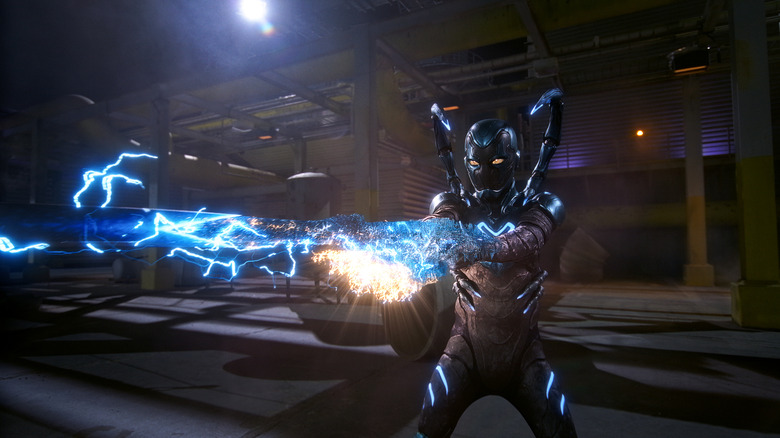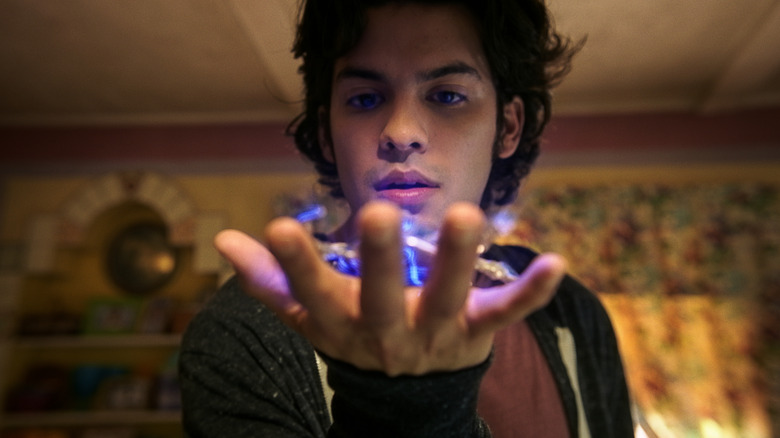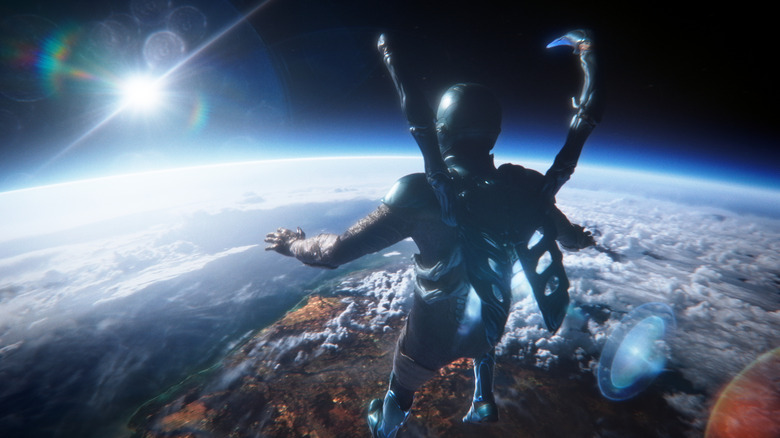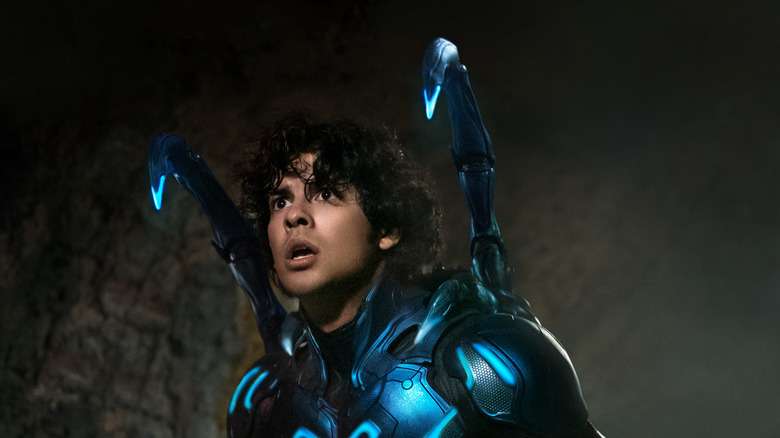Blue Beetle Review: A Fun But Frustratingly Shabby And Rushed Superhero Movie
It's been 15 years since the release of Jon Favreau's "Iron Man," the film that kicked off, in earnest, both the Marvel Cinematic Universe and the dominance of superhero cinema in the pop firmament in general. In the ensuing decade and a half — while traversing a massive, byzantine catacomb of interlocking superhero mythologies and (shudder) endless online discourse — audiences have come to innately accept the ways superheroes operate. Heroes live in a glittering fictional universe, replete with near-future technology, overseen by moral or industrial titans who have come to stand in for every other known type of celebrity. We're so damn deep in superhero lore that ultra-humans are slowly coming to replace us all, very much in the same way that Pokémon, in their own bizarre universe, have replaced animals of more traditional taxonomies.
Ángel Manuel Soto's new film "Blue Beetle" is the 14th film in the disintegrating DC Extended Universe (unless it's actually part of the new DC plan; details are kind of sketchy), and the franchise's penultimate chapter (James Wan's "Aquaman and the Lost Kingdom" is due in theaters this December). It doesn't make heavy reference to films like "Man of Steel" or "Birds of Prey," but it has seemingly inherited a bland, weary acceptance, now a feature of the genre. It has all the colorful action that superhero fans may crave, but I suppose it may be asking too much to expect a true sense of astonishment. Once the dominance of a genre is old enough to get its learner's permit, no one seems to be awestruck by the extraordinary any longer.
As such, "Blue Beetle" races breathlessly through its paces, hopped up on Jarritos, chattering through plot points that would have been dazzling in 2008, but now feel like the final lap of a marathon. This is the way the genre ends, with affable fluff.
Es todo acerca de la familia
While the undirected energies of "Blue Beetle" might leave audiences dizzy, Soto has grounded the proceedings in a recognizable and exciting bedrock of Mexican culture. Set in the fictional town of Palerma City, "Blue Beetle" follows Jaime Reyes (Xolo Maridueña) a recent college graduate and generally put-upon Dickensian everyman, who is, like a Dickens character, surrounded by much more interesting, colorful supporting players. His sister Milagro (Belissa Escobedo) is sarcastic and stylish. His Uncle Rudy (George Lopez) is obsessed with machines, trucks, and completing his transformation into Doc Brown (a comparison the film makes). His father and mother (Elpidia Carillo and Damián Alcázar) are eager to overcome adversity. And Nana (a standout Adriana Barraza) might have done more in the Revolution than she let on.
Jaime is invited to a job interview at Korg, the local American corporate monolith. He was invited by the comely Jenny (Bruna Marquezine) after Jenny's villainous aunt Victoria (Susan Sarandon) fired him from his brand new hotel job. Instead of an interview, however, Jaime is frantically handed a fast food container and quickly asked to flee. At home, Jaime finds that was handed a mystical beetle-shaped alien artifact simply called the Scarab. It resembles the blood-draining device from Guillermo Del Toro's 1993 horror film "Cronos," a flick that flashes past a TV screen as Nana channel surfs early in the film.
The Scarab, it turns out, is a sentient machine that attaches itself to Jaime's back and provides him with a blue-and-black, full-body suit of indestructible plastic armor and high-tech eyeballs. The Scarab, speaking in the voice of actress Becky G, can also manifest weapons out of thin air, force Jaime to fly, and provide a cornucopia of powers that are never fully explained.
Escarabajo Azul
The conflict? Sarandon wants the Scarab to power a line of military death suits. Her henchman wears one and he will be the central antagonist in the Final Fight.
"Blue Beetle" is clearly bored with exposition, and has no interest in explaining the finer points of its mythos. Not that the audience needs expansive flowcharts and paragraphs of backstory to enjoy a lighthearted superhero romp, but without crucial moments of magical speculation from the characters, "Blue" robs itself of awe. Jaime may seem panicked when the Scarab is launching him into space or forcing him to fight villains against his will, but he is not given a moment to pause and assess the situation. How does he feel about the creature living on his spine? What does it mean from a practical standpoint? Can he use it to save his family home from foreclosure? Or are superheroes so common now that such transmogrifications no longer inspire stupefaction?
One might posit that the mysteries of the Scarab, where it came from, and why it magically protects its hosts, are to be answered in future sequels. Knowing, however, that the DCEU is on its waning edge, such mysteries will remain forever unsolved. Unless, of course, the rebooted continuity planned by Peter Safran and James Gunn involves Blue Beetle, but by then, will anyone still care about what the umpteenth rendition of Superman has to say about him?
And without the now-common notion of an expanded cinematic universe to fall back on, "Blue Beetle" has to stand by itself, exposing only its own dubious merits, mirthless humor, lackluster thrills, Saturday morning cartoon-level plot, and admittedly fun characters and visuals. By itself, it's nearly nothing. A passable, insubstantial August entertainment set in a once grand and now-dying world.
¡Que viva México!
"Blue Beetle," however, gets a lot of mileage from its Mexican cultural touchpoints. Not a frame passes without some genuine local details. It's revealed partway through the film that Jenny's now-missing father was once a superhero called the Blue Beetle, and that he wore a luchador-like outfit reminiscent of Blue Demon, one of Mexico's most popular free wrestlers. There is a scene wherein Rudy hacks into a security camera feed and feeds in an animated episode of "El Chapulín Colorado." The Susan Sarandon character also notes that her henchman, the villainous Carapax (Raoul Max Trujillo) is a graduate of the School of the Americas. One might hope that younger audience members have the wherewithal to look up what that is.
But while these moments of Latine authenticity are briefly cathartic, they come smothered in superhero nonsense that we're asked to too readily accept. The original Blue Beetle, for instance, left behind a massive high-tech beetle-shaped rocket that Rudy somehow knows how to fly. Jenny's father's many technological marvels make the Blue Beetle suit seem average in comparison, and few people seem the least bit astonished. In a superhero film, when the heroic family is charging to the rescue in a souped-up bugmobile, it should not feel like they dispassionately piled into a minivan to go to the mall.
Overall, the details of "Blue Beetle" are fun, and the characters may inspire a few warm familial smiles, but the whole is frustratingly shabby and rushed. I prefer low stakes and a light, quick tone over the turgid and viscous drama of, say, "Batman v Superman: Dawn of Justice," but I would also like a sense of joy and adventure. Give it a few more drafts and "Blue Beetle" may have emerged as something extraordinary.
/Film Rating: 5.5 out of 10



